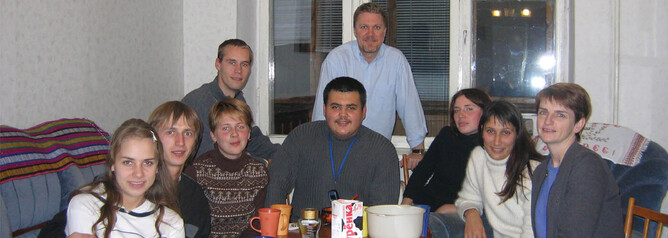The stereotypical image of the missionary is one who is resolute in their faith, boldly following the call of Jesus into lands and cultures far away. When hardships come, which we all know they will, and for which we all prepare, we will dig deep in our faith reserve and persevere through the tough times.
Over the years, in my own experience on the mission field, and in the lives of those missionaries my wife Kathy and I have trained, coached and cared for, we can indeed testify that there have been many hard times requiring perseverance. Yet I have become increasingly aware, over the last few years, of the important role vulnerability plays in my own life and the life and ministry of missionaries.
Brene Brown defines vulnerability as uncertainty, risk and emotional exposure, while Kristine Culp defines it as the susceptibility to being changed. With both of these definitions in mind, I want to explore the concept of vulnerability within the context of cross-cultural mission experience. Vulnerability is a useful lens through which to make sense of the emotions and experiences missionaries have as they live out their calling.
When Kathy and I, along with our two sons, first arrived in Ukraine, we felt well prepared for the rigours that were to follow. There are so many things for which I am thankful to God with regards to our life and ministry there. Seeing our former students now fully engaged in serving Jesus in various ways, fulfilling the purpose for which we went, is incredibly rewarding. The opportunities we had in life and ministry in serving Jesus, and the relationships with co-workers and nationals, have enriched us in so many ways. Yet what I have come to understand is that, in order to cope with the rigours of life and ministry in a challenging environment, I tried to build a wall of invulnerability around myself.
What I now realise is that living and working in Ukraine for me carried with it a significant degree of tension — between the joy and reward of fulfilling my God given calling and the challenges of our location. The city of Donetsk was dirty and polluted, poverty sat side-by-side with material excess. We lived in a small Soviet-era apartment with two young sons, home-schooling them while also working with a significant ministry load. There was little to do that we found relaxing and refreshing to try to relieve the stress.
As Brown notes in her definition, vulnerability involves uncertainty, risk and emotional exposure. I had always associated vulnerability with weakness and I wanted to be strong. All workers, myself included, have spoken and unspoken conceptions of what a missionary should be. For me, this image was something that developed over time based on my own personality, my understanding of God and mission at the time, messages I had heard from others, and from the culture I came from and entered into. Australian culture prizes rugged individualism and results. Russian and Ukrainian Christians are often very stoic in the face of adversity, and this unconsciously interacted with my own character and sense of self. Therefore, to be effective for God and for my own sense of self, I tried to avoid or deny uncertainty, risk and emotional exposure — all the while not realising that these were in fact ever present factors in my life and ministry. This is true not only for me but for
many missionaries serving around the world.
The danger or pitfall was that I failed to acknowledge the things with which I struggled — in my eyes that would have been weakness. I was unaware how deeply poverty affected me, or that living in a small apartment without access to recreational activities, stifled me. When close missionary friends and colleagues left the field I ignored the emotional impact that was caused by the loss of those friendships. I overlooked that my desire to please others meant I couldn’t set healthy boundaries in my work at the seminary. Consequently, I took on more work than I was able to manage in the circumstances. I failed to see that I was not being spiritually enriched through regular sermons and worship in my own language. My self-imposed desire to be strong led to a failure to acknowledge these issues, which in turn led to a cumulative impact on my thinking and emotions. If I acknowledged them to myself, God, Kathy or to colleagues and supporters, then I felt I would be a failure in terms of the image I had of the effective missionary.
This is not to say that life and ministry were without joys and incredibly rewarding and fun times, for there were many of those. In reality these joys sat alongside the hardships in my life. This is the reality with which many missionaries live — the joys and hardships sit side by side. One doesn’t negate the other. Yet, in order to be strong I attempted to embrace the one while denying the other, which meant I was actually weakening myself — the opposite of what I thought would happen.
What Brown and Culp recognise is that vulnerability is not the same as weakness. It is being open in one’s self to risk and uncertainty, to joy as well as pain, and this openness results in change. I had made a choice to avoid pain and uncertainty. By failing to acknowledge these things and be vulnerable before God, Kathy and others, I built a wall around myself cutting myself off from growth and from access to the very rich resources that were available to me.
In the end the stress of thinking this way led, in my last year in Ukraine, to numerous stress-related health issues as well as a significant battle with anxiety and depression. Naturally, this impacted my effectiveness as a missionary, to say nothing of the impact on my family. I was forced in a very real way to confront my own vulnerability.
After finishing our service in Ukraine we moved to a new phase of ministry based in the Netherlands. In addition to receiving appropriate help in Australia, I found a measure of healing from the beautiful and more peaceful environment in which we now live. Therefore, some of the elements that I found challenging in Ukraine are no longer present. Yet we were tested in a whole new way here as we endured a long and difficult battle to gain a permit to live and work in the Netherlands. Little did we expect it to be such a long and drawn-out affair. It was a test of endurance. We tried to maintain trust in God even when things made no sense, and tried to help our sons navigate through the process despite our own confusion. This led to a new level of understanding of what vulnerability means — the risk was high, we had no certain status and an unclear future — all elements of Brown’s definition of vulnerability.
Through the process of recovery and in reflection in the years since then, I have come increasingly to understand the importance of vulnerability. This in turn has actually added to my own effectiveness in ways that I previously would not have expected. So, after these years of mission service through the experiences of both the highs and lows, the joys and struggles, the successes and failures, what have I learned about vulnerability and life and ministry in mission? How have I changed by being more vulnerable?
First, it has impacted my relationship with God and my understanding of God. It helped me develop a place for suffering in my life and theology. I believe that developing a theology of suffering is an essential part of the missionary journey as it helps us maintain relationship with God by making a place for the inevitable pain we experience on the field. The Apostle Paul rightly affirmed in 2 Corinthians 12:10, “For when I am weak, then I am strong.” Paul realised that when he acknowledged his struggles and weakness he was forced, in a sense, to rely on the strength of Jesus in his life. I have come to understand that it is healthy to acknowledge my vulnerability before God and that I have nothing to prove to God. In being vulnerable I open myself to God’s strength, love and grace to be present in me and at work through me in the good times and the struggles.
In learning to be vulnerable I have sought to take down the walls I built around myself. As the walls have come down I find myself more open to inviting God and others into my life to walk with me through these challenges. All missionaries wrestle with issues on the mission field and many build walls around themselves to cope. When we seek to be vulnerable it means we are more likely to be open to seek help from others, to invite others in to help us grow.
In coming to understand vulnerability in a new light I see that I have grown in empathy and compassion for others. My ministry role in the Netherlands, which involves pastoral care of field workers and training new workers, has benefitted greatly. Empathy is a key characteristic for those in leadership and who care for others. If we never show ourselves to be vulnerable to those we lead or care for, there will always be, to some degree, a wall between us. It reduces the possibilities for real connection. How can you be open with and trust someone fully who does not show that they are open and can empathise with what you experience? This level of empathy has been a key ingredient to the type of care we seek to provide for missionaries. Through being vulnerable about my own experiences it helps create trust in the relationship and our workers find a safe place to be themselves.
Finally, it has shaped how we equip and train our workers. In our role of leading the orientation program for ITeams Netherlands over the last number of years Kathy and I have been able to introduce elements into the program based on what we have learned. Mission preparation is not just about the skills of language, cultural adjustment and so on, it is as much, if not more, about the personal and spiritual preparation of those in the program. It is about creating a space in the program where relationships of trust are built, where realities of suffering are explored and how we can invite God into those areas we struggle in. Trainees feel they can be vulnerable by acknowledging their areas of struggle, knowing that our team is willing to support them in growing through these issues.
Being vulnerable means being open to risk and uncertainty, and the life of a missionary, by its very nature, is one of risk and uncertainty. My early attempts at being strong and effective, while well-intentioned, ended with walls around myself. What I have learned is that vulnerability is not weakness — it requires strength and courage to dismantle the walls we build around ourselves. Being vulnerable is still something I am growing to understand more of; yet the fruit of it, personally and spiritually, brings a richness to my walk with God, my life and ministry that was not previously possible.
by John Harris


